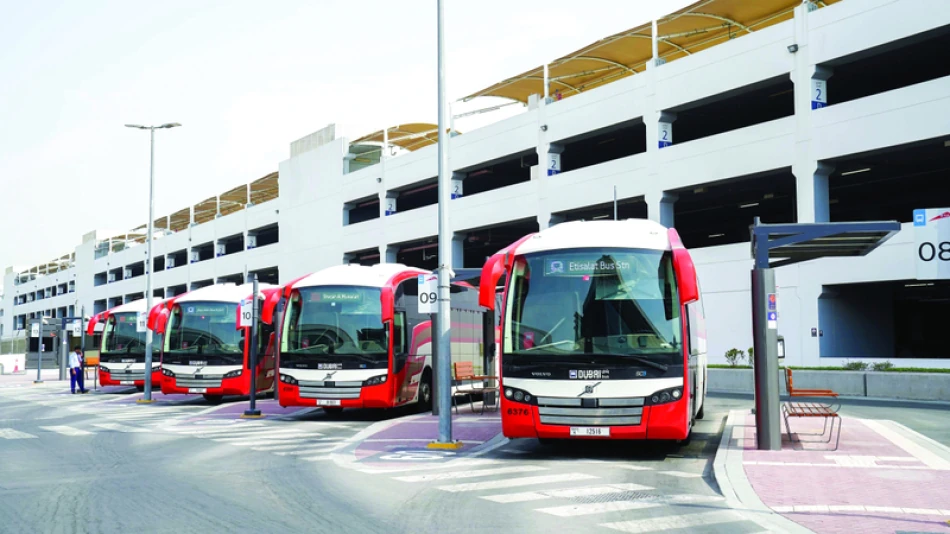
Dubai Unveils Comprehensive Public Transport Upgrades: 22 New Passenger Stations and Bus Depots
Dubai Transforms Public Transit with Major Bus Network Overhaul
Dubai's Roads and Transport Authority has completed a comprehensive upgrade of 22 bus stations across the emirate, marking a significant step in the city's ambitious plan to revolutionize public transportation. The project, encompassing 16 passenger stations and six bus depots, represents more than infrastructure improvement—it's a strategic push to shift Dubai's car-dependent culture toward sustainable mass transit.
Beyond Basic Transport: Dubai's Vision for Integrated Mobility
The station upgrades reflect Dubai's broader ambition to create a seamlessly connected transport ecosystem. Mattar Al Tayer, Director General of Dubai's RTA, emphasized that these stations serve far more than basic waiting areas—they're designed as comprehensive service hubs that integrate with Dubai Metro, taxis, and cycling infrastructure.
This approach mirrors successful transit integration models seen in Singapore and Hong Kong, where multimodal connectivity has proven essential for reducing private vehicle dependency. The inclusion of prayer rooms, bicycle parking, and accessibility features for people with disabilities demonstrates Dubai's commitment to serving its diverse population.
Strategic Geographic Distribution
The 16 passenger stations are strategically distributed across Dubai's core areas—nine in Deira and seven in Bur Dubai—covering 110 bus routes with capacity for 710 buses during peak hours. This geographic spread ensures comprehensive coverage of Dubai's most densely populated commercial and residential districts.
Fleet Modernization Signals Environmental Commitment
Dubai's recent contract for 637 new buses represents the UAE's largest public transport procurement deal and signals a clear environmental pivot. The fleet includes 40 fully electric buses—the first major electric bus deployment in the Gulf region—alongside 597 Euro 6 compliant vehicles that significantly reduce carbon emissions.
This environmental focus aligns with global trends as cities worldwide grapple with air quality concerns and climate commitments. The inclusion of double-decker buses (76 units) and articulated buses (70 units) for high-density routes demonstrates sophisticated route planning that maximizes passenger capacity while minimizing environmental impact.
Regional Leadership in Sustainable Transport
The electric bus initiative positions Dubai ahead of regional competitors in sustainable transport adoption. While Saudi Arabia's NEOM project promises futuristic transport solutions and Qatar expanded bus services for the World Cup, Dubai's practical implementation of electric buses for daily operations represents tangible progress rather than aspirational planning.
Economic and Urban Planning Implications
The bus network expansion supports Dubai's economic diversification strategy by improving connectivity to industrial zones like Jebel Ali and emerging districts. Enhanced public transport access typically increases property values along transit corridors and reduces the total cost of living by diminishing private vehicle dependency.
For Dubai's large expatriate workforce, many of whom cannot afford private vehicles, improved bus services represent significant quality-of-life improvements. The project also supports Dubai's tourism sector by providing visitors with reliable, affordable transport alternatives to expensive taxis.
Investment in Infrastructure Resilience
The depot upgrades in Al Khawaneej, Al Qusais, Al Ruwayyah, Al Aweer, Jebel Ali, and Al Quoz enhance operational efficiency through improved maintenance facilities, driver accommodation, and security systems. This behind-the-scenes investment ensures service reliability—a critical factor in convincing residents to abandon private vehicles for public transport.
Dubai's comprehensive approach—upgrading both passenger-facing stations and operational infrastructure simultaneously—demonstrates sophisticated transport planning that addresses both user experience and system sustainability. This dual focus positions Dubai's bus network for long-term success in a region where public transport adoption has historically lagged behind private vehicle ownership.
Most Viewed News

 Sara Khaled
Sara Khaled






